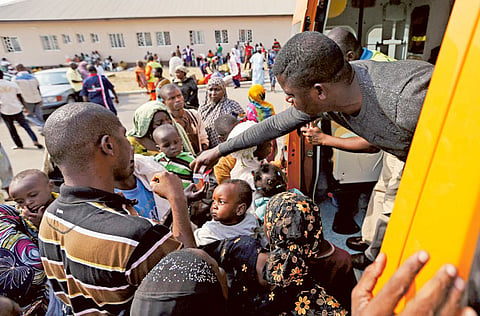Bangui’s crowded airport camp reflects realities of Central African Republic conflict
100,000 people, Muslim and Christian, fled their homes and are crammed into a vast tent city

Bangui, Central African Republic: In the mist and pale light of dawn, the makeshift camp near Bangui’s airport was waking up. Between the hulks of ruined civilian planes, thousands of displaced people prepared for another tough day.
Some 100,000 people who had fled their homes are crammed into a vast tent city near the bases of foreign soldiers at the airport — a microcosm of the conflict wracking the Central African Republic.
A relief worker points out that like in the country as a whole, there is a Christian majority and a fearful Muslim minority at the camp, along with sporadic clashes and signs of a humanitarian crisis.
The landlocked country descended into crisis after a coup in March last year by a rebel coalition called the Seleka, who then installed their leader Michel Djotodia as the country’s first Muslim president.
Djotodia later ordered them to disband, but has proved unable to control the fighters who went on killing, raping and pillaging, prompting Christians to form vigilante groups in response.
Nearly a million people have been displaced since the coup, and more than 1,000 killed in the past month alone.
Beside the runway where a huge Antonov cargo aircraft with UN supplies thundered in to land, displaced residents say they mostly fled the capital Bangui because of the violence pitting Muslim former rebels against Christian militias in a deadly cycle of revenge attacks.
They have brought the overcrowded camp to bustling life, with small shops selling whatever basic produce is available, telephones and other goods, while hairdressers have opened their stalls.
“I have been trying to sell stuff for a week,” Ernest says behind his meagre display of goods. “But we are looking for food. We fled a war. There’s no money, nothing to eat.”
Many people never leave the makeshift camp for the capital, fearing attacks.
One camp resident Vivien, 27, told AFP that she makes return trips to her home in Bangui to retrieve whatever she can, “when there’s no shooting”.
The tension in the airport camp runs as high as on the streets of Bangui. An elderly woman, Louise, said that “if we want to share out our food, young men armed with machetes come to take away all that the aid workers give. This is wrong.”
Resentful Christians often gather at the roadside to stone and insult convoys of foreign Muslims leaving the CAR for fear of attack, including people from Cameroon and particularly Chad.
In Bangui itself, Chadian Rahama Bichara, 47, faced with militias and angry crowds, said that his family in 2007 had “come to seek peace, but now we have to leave to find it somewhere else.”
His compatriot Ebrahim Tidjani had a similar story. “I arrived here in 1998. At home, it was too dangerous, we were always threatened and many of my family were killed. Today I have to relive all that and it’s unbearable.”
A Muslim who ventures out on Bangui streets has run the risk of meeting up with a lynch mob, but this past week the Chadian troops in the African force known as MISCA rolled into the city to protect convoys and embassy premises.
For fleeing foreigners, the road out of Bangui passes right by the airport, which operates on a day-to-day basis, making it difficult to predict incoming and outgoing flights. Everything depends on the situation in the capital.
A newly arrived French businessman who asked not to be named had a striking memory of his first moments in the CAR. “Our plane landed, at least that happened, but there was quite a lot of shooting close by the airport perimeter. It was impossible to get out and because of the curfew, I slept here.”
On the tarmac, the huge Antonov opened its hold, crammed full of heavy metal crates bearing the stamp of the United Nations. The plane has made a big aid delivery, but the supplies are never enough to cope with the scale of the CAR’s humanitarian crisis.
A few metres away, the French flag snaps in the heat of the dry season over Camp Boali, which is home to the 1,600 troops of Operation Sangaris, with patrols regularly leaving for Bangui on a mission to disarm militia forces.
The airport car park is favoured by the street kids locally known as “Godobes”, who try to sell the military rations they get from French soldiers and the African contingent.
The French and African troops share the task of making the sector secure.
“We do our best, but it’s out of control. They have weapons, knives, machetes,” a Cameroonian officer says, before rushing away to see to a young Muslim who has just been attacked on his motorcycle.
Sign up for the Daily Briefing
Get the latest news and updates straight to your inbox



